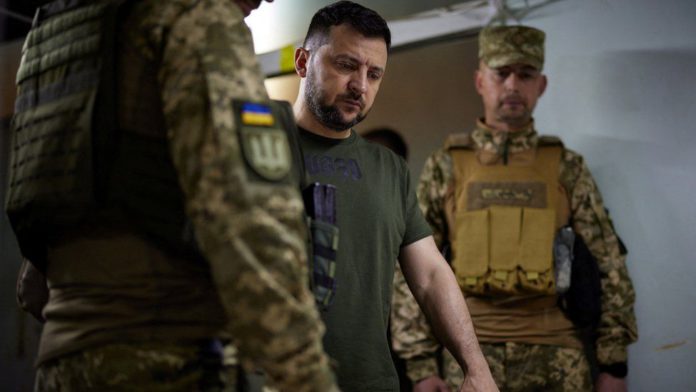A key advisor to Ukraine’s president has said the battle for the eastern cities of Severodonetsk and Lysychansk has reached a “fearsome climax”.
Oleksiy Arestovych said Russian forces could soon encircle the twin cities and cut them off from Ukrainian territory.
“The threat of a tactical Russian victory is there, but they haven’t done it yet,” he said.
It comes as President Volodymyr Zelensky accused Moscow of trying to “destroy” the Donbas region.
“There were massive air and artillery strikes in Donbas. The occupier’s goal here is unchanged, they want to destroy the entire Donbas step-by-step,” Mr Zelensky said in his nightly video address.
He also repeated his calls for Western leaders to speed up the delivery of heavy artillery to his troops.
“We again and again emphasize the acceleration of arms deliveries to Ukraine. What is quickly needed is parity on the battlefield in order to halt this diabolical armada and push it beyond Ukraine’s borders.” he said.
READ ALSO:
Russia has directed much of its attention to Severodonetsk and Lysychansk, which are the final Ukrainian outposts in the Luhansk region, and in recent days Moscow’s forces appear to be making some progress in their attempt to encircle Ukrainian troops there.
Regional Governor Serhiy Haidai said on Thursday that two key settlements to the south of the cities had been captured and suggested that troops in the town of Zolote, which has been on the front line of fighting since 2014, may be forced to retreat.
In its daily update, the UK’s ministry of defence said that Russian forces have advanced over 5km (3 miles) towards the southern perimeter of Lysychansk this week.
“Some Ukrainian units have withdrawn, probably to avoid being encircled. Russia’s improved performance in this sector is likely a result of recent unit reinforcement and heavy concentration of fire,” UK officials said.
On Wednesday, Mr Haidai said Russian shelling has “significantly destroyed infrastructure and housing” in Lysychansk.
He added that Severodonetsk is also shelled “every day”, despite Moscow’s forces having seized much of the city. Hundreds of civilians remain trapped there, with many of them seeking shelter in the sprawling Azot chemical plant.
But Mr Arestovych said fighting in both cities had slowed significantly after Ukraine inflicted heavy losses on Russian forces, which he claimed are now made up of significant numbers of conscripted troops. The BBC cannot verify this claim and Russia denies using conscripts in the war.
“It’s like two boxers grappling with each other in the 18th round of a bout and barely able to move things forward. This operation started on 14 April and has been going on for nearly 80 days,” he said.
Elsewhere, Russia resumed its shelling of Ukraine’s second city of Kharkiv on Wednesday morning.
Many civilians had started to return to the city after Russian forces were pushed back across the border, but fears have grown that Moscow could be planning a fresh assault in the region.
Meanwhile, Russia accused Ukraine of using drones to attack an oil refinery in the Rostov region, close to the Ukrainian border.
“As a result of terrorist actions from the western border of the Rostov region, two unmanned aerial vehicles struck at the technological facilities of Novoshakhtinsk,” representatives of the plant said in a statement.
Social media footage appeared to show the unmanned vehicles smashing into the refinery in a rare direct assault on Russian territory. Officials in Kyiv have yet to comment on the attack.
And near the occupied city of Kherson, the pro-Russian administration accused “Ukrainian saboteurs” of attempting to carry out the “failed assassination” of the Moscow appointed head of a town.
The Russian state news agency Tass claimed the head of Chernobaevka, Yuri Turulev, was injured in an attempted car bombing by Ukrainian partisan forces.
It is difficult to determine the extent of the pro-Kyiv insurgency in Kherson, but several attacks have been reported in the city and a dedicated government department, the Centre for National Resistance, has been set up to coordinate partisan activity.
The intense fighting comes as EU leaders are expected to approve Ukraine’s application for candidate status of the bloc.

